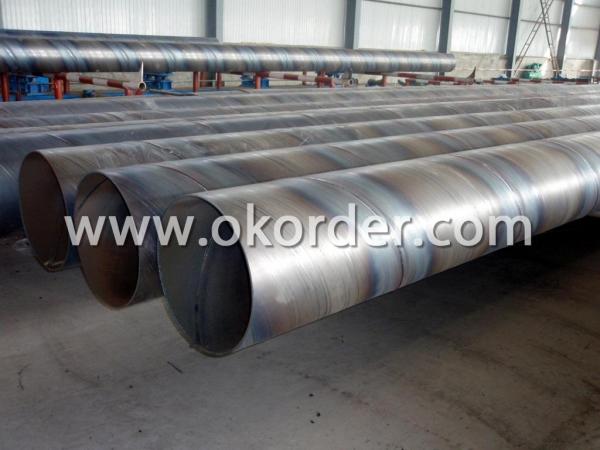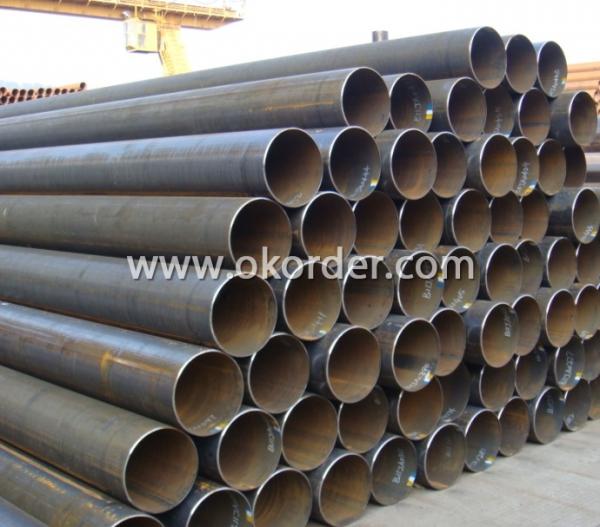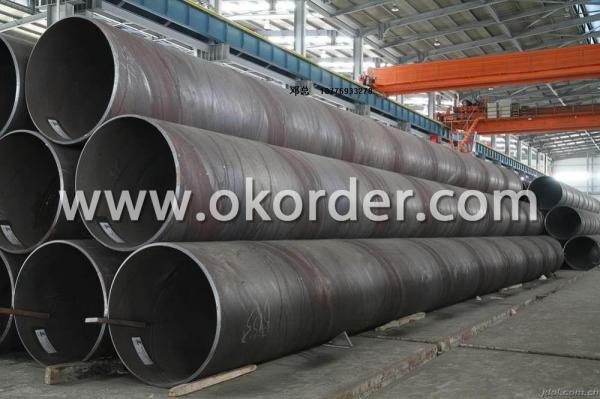SSAW Welded Steel Pipes API SPEC 5L API SPEC 5CT ASTM A53 GB/T9700.1 Black Line Pipe
- Loading Port:
- Tianjin Port
- Payment Terms:
- TT or L/C
- Min Order Qty:
- 50MT m.t.
- Supply Capability:
- based on order m.t./month
OKorder Service Pledge
OKorder Financial Service
You Might Also Like
1.Specification of SSAW Welded Steel Pipes API SPEC 5L, API SPEC 5CT, ASTM A53, GB/9700.1 Black
1)Application: It is widely applied to line pipe in oil and sewage transportation , and it is used in Low pressure liquid and gassy transportation and it is also good Structure pipe in building and bridge field.
2)Standard: API SPEC 5L, API SPEC 5CT, ASTM A53, GB/T9700.1
3)Steel Grade: API SPEC 5L: B, X42, X46, X52, X56, X60, X65;API SPEC 5CT: J55, K55, N80, L80-1; ASTM A53: A, B, C;GB/T9700.1:L242、L290、L320、L360、L390、L415、L450
2.Sizes of Pipes
*Remark: Besides below sizes, we also can arrange production based on requirement of customers
OD | WT | ||||||||
Noninal Pipe size Inches | OD MM | 10 | 20 | 30 | STD | 40 | 60 | XS | 80 |
12 | 323.90 |
| 6.35 | 8.38 | 9.53 | 10.31 | 14.27 | 12.70 | 17.48 |
14 | 355.60 | 6.35 | 7.92 | 9.53 | 9.53 | 11.13 | 15.09 | 12.70 | 19.05 |
16 | 406.40 | 6.35 | 7.92 | 9.53 | 9.53 | 12.7 | 16.66 | 12.70 | 21.44 |
18 | 457.00 | 6.35 | 7.92 | 11.13 | 9.53 | 14.27 | 19.05 | 12.70 | 23.88 |
20 | 508.00 | 6.35 | 9.53 | 12.7 | 9.53 | 15.09 | 20.62 | 12.70 | 26.19 |
22 | 559.00 | 6.35 | 9.53 | 12.7 | 9.53 |
| 22.23 | 12.70 | 28.58 |
24 | 610.00 | 6.35 | 9.53 | 14.27 | 9.53 | 17.48 | 24.61 | 12.70 | 30.96 |
26 | 660.00 | 7.92 | 12.70 |
| 9.53 |
|
| 12.70 |
|
28 | 711.00 | 7.92 | 12.70 | 15.88 | 9.53 |
|
| 12.70 |
|
30 | 762.00 | 7.92 | 12.70 | 15.88 | 9.53 |
|
| 12.70 |
|
32 | 813.00 | 7.92 | 12.70 | 15.88 | 9.53 | 17.48 |
| 12.70 |
|
34 | 864.00 | 7.92 | 12.70 | 15.88 | 9.53 | 17.48 |
| 12.70 |
|
36 | 914.00 | 7.92 | 12.70 | 15.88 | 9.53 | 19.05 |
| 12.70 |
|
38 | 965.00 |
|
|
| 9.53 |
|
| 12.70 |
|
40 | 1016.00 |
|
|
| 9.53 |
|
| 12.70 |
|
42 | 1067.00 |
|
|
| 9.53 |
|
| 12.70 |
|
44 | 1118.00 |
|
|
| 9.53 |
|
| 12.70 |
|
46 | 1168.00 |
|
|
| 9.53 |
|
| 12.70 |
|
48 | 1219.00 |
|
|
| 9.53 |
|
| 12.70 |
|
3.Packing & Delivery
1) Packing Detail:Bundles with anti-rust painting and with plastic caps
2) Delivery Term: 30-40 days after receving prepayment or L/C
4.Data Sheet
Standard: API SPEC 5L
Mechanical Properties
Standard | Grade | (MPa) | (MPa) | ||
Yield strength | Tensile Strength | ||||
API SPEC 5L | PSL1 | ||||
B | ≥241 | ≥414 | |||
×42 | ≥290 | ≥414 | |||
×46 | ≥317 | ≥434 | |||
×52 | ≥359 | ≥455 | |||
×56 | ≥386 | ≥490 | |||
×60 | ≥414 | ≥517 | |||
×65 | ≥448 | ≥531 | |||
×70 | ≥483 | ≥565 | |||
PSL2 | |||||
Min | Max | Min | Max | ||
B | 241 | 448 | 441 | 758 | |
×42 | 290 | 496 | 414 | 758 | |
×46 | 317 | 524 | 434 | 758 | |
×52 | 359 | 531 | 455 | 758 | |
×56 | 386 | 544 | 490 | 758 | |
×60 | 414 | 565 | 517 | 758 | |
×65 | 448 | 600 | 531 | 758 | |
×70 | 483 | 621 | 565 | 758 | |
Chemical Composition(%)
Standard | Grade | C | Mn | P | S | TI | CEV |
Max | Max | Max | Max | Max | Max | ||
API SPEC 5L | PSL1 | ||||||
B | 0.26 | 1.2 | 0.030 | 0.030 | 0.04 |
- | |
×42 | 0.26 | 1.3 | 0.030 | 0.030 | 0.04 | ||
×46,×52,×56,X60 | 0.26 | 1.4 | 0.030 | 0.030 | 0.04 | ||
X65 | 0.26 | 1.45 | 0.030 | 0.030 | 0.06 | ||
X70 | 0.26 | 1.65 | 0.030 | 0.030 | 0.06 | ||
PSL2 | |||||||
B | 0.22 | 1.20 | 0.025 | 0.015 | 0.04 |
0.43 | |
×42 | 0.22 | 1.30 | 0.025 | 0.015 | 0.04 | ||
×46,×52,×56, X60 | 0.22 | 1.40 | 0.025 | 0.015 | 0.04 | ||
X65 | 0.22 | 1.45 | 0.025 | 0.015 | 0.06 | ||
X70 | 0.22 | 1.65 | 0.025 | 0.015 | 0.06 | ||
Standard: GB/9711.1
Mechanical Properties
Standard | Grade | (MPa) | (MPa) | Min(%) |
Yield strength | Tensile Strength | Elongation | ||
GB/T9711.1 | L245 | ≥245 | ≥415 | 21 |
L290 | ≥290 | ≥415 | 21 | |
L320 | ≥320 | ≥435 | 20 | |
L360 | ≥360 | ≥460 | 19 | |
L390 | ≥390 | ≥490 | 18 | |
L415 | ≥415 | ≥520 | 17 | |
L450 | ≥450 | ≥535 | 17 | |
L485 | ≥485 | ≥570 | 17 |
Chemical Composition(%)
Standard | Grade | C | Mn | P | S |
Max | Max | Max | Max | ||
GB/T9711.1 | L245 | 0.26 | 0.15 | 0.030 | 0.030 |
L290 | 0.28 | 1.25 | 0.030 | 0.030 | |
L320, L360 | 0.30 | 1.25 | 0.030 | 0.030 | |
L390, L415 | 0.26 | 1.35 | 0.030 | 0.030 | |
L450 | 0.26 | 1.40 | 0.030 | 0.030 | |
L485 | 0.23 | 1.60 | 0.025 | 0.030 |
Standard: GB/9711.2
Mechanical Properties
Standard | Grade | (MPa) Yield strength | (MPa) Tensile Strength | Min(%) Elongation | ||
GB/T9711.2 | Rt0.5Min | Rt0.5Max | RmMin | Rt0.5/Rm Max | ||
L245 | 245 | 440 | 0.80 |
22 | ||
L245 | 0.85 | |||||
L290 |
290 | 440 | 0.80 | 21 | ||
L290 | 0.85 | |||||
L360 |
360 | 510 | 0.85 |
20 | ||
L360 | 0.85 | |||||
L415 | 415 | 565 | 0.85 |
18 | ||
L415 | 0.85 | |||||
L450 | 450 | 570 | 535 | 0.87 | 18 | |
L485 | 485 | 605 | 570 | 0.90 | 18 | |
Chemical Composition(%)
Standard | Grade | C | Mn | P | S | V | Nb | Ti | CEV |
Max | Max | Max | Max | Max | Max | Max | Max | ||
GB/T9711.2 | L245NB | 0.16 | 1.1 | 0.025 | 0.020 | - | - | - | 0.42 |
L290NB | 0.17 | 1.2 | 0.025 | 0.020 | 0.05 | 0.05 | 0.04 | 0.42 | |
L360NB | 0.20 | 1.6 | 0.025 | 0.020 | 0.10 | 0.05 | 0.04 | 0.45 | |
L415NB | 0.21 | 1.6 | 0.025 | 0.020 | 0.15 | 0.05 | 0.04 | - | |
L245NB, L290NB |
0.16 |
1.5 | 0.025 | 0.020 |
0.04 |
0.04 |
- |
0.4 | |
L360NB | 0.16 | 1.6 | 0.025 | 0.020 | 0.05 | 0.05 | 0.04 | 0.41 | |
L415NB | 0.16 | 1.6 | 0.025 | 0.020 | 0.08 | 0.05 | 0.06 | 0.42 | |
L450NB | 0.16 | 1.6 | 0.025 | 0.020 | 0.10 | 0.05 | 0.06 | 0.43 | |
L485NB | 0.16 | 1.7 | 0.025 | 0.020 | 0.10 | 0.06 | 0.06 | 0.43 |
5. Products Showroom



- Q:How are steel pipes insulated to prevent noise transmission?
- Steel pipes are typically insulated using specialized materials that are specifically designed to reduce noise transmission. These insulation materials, such as foam or mineral wool, are wrapped around the steel pipes to create a barrier that absorbs sound waves and prevents them from traveling through the pipes. Additionally, the insulation is often covered with a protective layer, such as aluminum or PVC, to further enhance the soundproofing properties and provide mechanical protection to the insulation.
- Q:What is the difference between steel pipe and fiberglass pipe?
- Steel pipe and fiberglass pipe differ in terms of material composition, durability, flexibility, and cost. Steel pipe is made of steel, which provides strength and resilience, making it ideal for high-pressure applications and underground installations. Fiberglass pipe, on the other hand, is composed of reinforced plastic fibers, resulting in a lightweight and corrosion-resistant material suitable for above-ground and corrosive environments. While steel pipe offers higher tensile strength, fiberglass pipe excels in its flexibility, allowing for easier installation and reduced maintenance. Additionally, steel pipe is typically more expensive due to the cost of materials and manufacturing processes, while fiberglass pipe is more cost-effective in terms of initial installation and long-term maintenance.
- Q:Can steel pipes be used for steam distribution?
- Yes, steel pipes can be used for steam distribution. Steel pipes are commonly used for conveying steam due to their high heat resistance and durability. They can withstand the high temperatures and pressures associated with steam distribution, making them a suitable choice for this application.
- Q:What are the applications of galvanized steel pipes?
- Galvanized steel pipes have a wide range of applications in various industries. They are commonly used in plumbing systems to deliver water and gas due to their excellent corrosion resistance. Additionally, they are used in the construction industry for structural purposes, such as scaffolding, fences, and handrails. Galvanized steel pipes are also utilized in the agricultural sector for irrigation systems and as posts for supporting crops. Furthermore, they find usage in oil and gas pipelines, HVAC systems, and automotive manufacturing. Overall, the applications of galvanized steel pipes are diverse, making them an essential material in multiple sectors.
- Q:Are steel pipes suitable for underground irrigation pumping?
- Yes, steel pipes are suitable for underground irrigation pumping. Steel pipes are known for their durability and strength, making them an ideal choice for underground applications. They can withstand high levels of pressure, resist corrosion, and are less likely to be affected by external factors such as soil movement or temperature changes. Additionally, steel pipes have a longer lifespan compared to other materials, reducing the need for frequent replacements. However, it is important to ensure that the steel pipes are properly coated or lined to prevent corrosion and to regularly inspect and maintain them to ensure their effectiveness and longevity.
- Q:Can steel pipes be used for transporting liquids?
- Yes, steel pipes can be used for transporting liquids. Steel pipes are commonly used in various industries, including oil and gas, water supply, and sewage systems, due to their durability, strength, and resistance to corrosion. They are effective for transporting liquids such as water, oil, natural gas, and chemicals over long distances efficiently and safely.
- Q:How are steel pipes used in the transportation of liquids and gases?
- Steel pipes are used in the transportation of liquids and gases due to their durability, strength, and resistance to corrosion. They are commonly used in industries such as oil and gas, water supply, and chemical processing. Steel pipes ensure the safe and efficient movement of fluids over long distances, as they can withstand high pressure and extreme temperatures. Additionally, their seamless construction minimizes the risk of leaks, making them essential for transporting various liquids and gases.
- Q:What are the different types of expansion joints used with steel pipes?
- There are several types of expansion joints used with steel pipes, including bellows expansion joints, universal expansion joints, hinged expansion joints, and gimbal expansion joints. These expansion joints are designed to accommodate the movement and thermal expansion of steel pipes, ensuring their integrity and preventing damage.
- Q:What are the different methods of inspecting steel pipes for defects?
- There are several methods for inspecting steel pipes for defects, including visual inspection, ultrasonic testing, magnetic particle inspection, eddy current testing, and radiographic testing.
- Q:How are steel pipes used in agriculture?
- Steel pipes are widely used in agriculture for various purposes. One common application is irrigation systems. Steel pipes can be used to transport water from a water source, such as a well or a reservoir, to different areas of a farm. These pipes are durable and can withstand the pressure of water, making them ideal for long-distance water transportation. Additionally, steel pipes are also used for drainage systems in agriculture. They can be used to remove excess water from fields, preventing waterlogging and ensuring proper drainage. Steel pipes are resistant to corrosion, which is important in agricultural settings where they may be exposed to moisture and various chemicals. Moreover, steel pipes are used in the construction of greenhouse structures. They provide structural support for the greenhouse framework and allow for the installation of irrigation systems and other equipment. Steel pipes are strong, sturdy, and can withstand harsh weather conditions, making them suitable for greenhouse construction. Furthermore, steel pipes are utilized in livestock farming. They are commonly used to create fences and enclosures for animals, providing a secure and durable barrier. Steel pipes are also used in the construction of animal shelters and barns. In summary, steel pipes play a crucial role in agriculture. They are used for irrigation systems, drainage systems, greenhouse construction, and livestock farming. Their durability, strength, and resistance to corrosion make them an excellent choice for various agricultural applications.
1. Manufacturer Overview |
|
|---|---|
| Location | Tianjin, China |
| Year Established | 2001 |
| Annual Output Value | 500,000Tons |
| Main Markets | Southeast Asia; Middle East; Oceania; Americas; Europe; Africa;etc. |
| Company Certifications | API 5L;API 5CT;ISO9001:2008 GB/T 19001-2008 |
2. Manufacturer Certificates |
|
|---|---|
| a) Certification Name | |
| Range | |
| Reference | |
| Validity Period | |
3. Manufacturer Capability |
|
|---|---|
| a)Trade Capacity | |
| Nearest Port | Tianjin;Qingdao |
| Export Percentage | 50% - 60% |
| No.of Employees in Trade Department | 1000-1100 People |
| Language Spoken: | English; Chinese; Spanish |
| b)Factory Information | |
| Factory Size: | Above 150,000 square meters |
| No. of Production Lines | Above 10 |
| Contract Manufacturing | OEM Service Offered; Design Service Offered |
| Product Price Range | Average |
Send your message to us
SSAW Welded Steel Pipes API SPEC 5L API SPEC 5CT ASTM A53 GB/T9700.1 Black Line Pipe
- Loading Port:
- Tianjin Port
- Payment Terms:
- TT or L/C
- Min Order Qty:
- 50MT m.t.
- Supply Capability:
- based on order m.t./month
OKorder Service Pledge
OKorder Financial Service
Similar products
New products
Hot products
Related keywords































